[This post Originally appeared on the site "Fogs Movie Reviews", which is now closed, in the Fall of 2013, It is being shared as part of my series of "Movies I Want Everyone to See".]
Since the invention of film there have been a number of stories that feature man against nature. Those stories have often cast a group of men against a an overwhelming natural force; Hurricanes, fires, floods, the cold of the poles, the heat of the desert and the savagery of animals trying to eat and live. My own experience with such films include "Jeremiah Johnson", "The White Dawn", and "Man in the Wilderness". In the American film experience, a number of these stories featured explorers or pioneers in the West, seeking to survive a trip through Indian lands, to build a new life for themselves or to profit from the natural resources they find on their journey. As part of the narrative there is often contact with other cultures and that contact takes a violent turn. Regardless of whether you sympathize with native peoples whose way of life is threatened or the intruder who sometimes acts foolishly and at other time heroically, these stories can be compelling and exciting. Westerns are littered with ill fated travelers being killed in brutal ways by Indian tribes they encounter (And of course the inverse is true as well, the intruders are not healthy for the native population either).
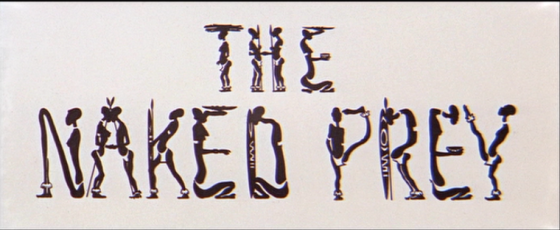
"The Naked Prey" takes a North American historical incident of this type and transplants it to a similar environment in Africa. An ivory hunting safari is waylaid as it engages in the slaughter of elephants. The hunters have managed to antagonize an indigenous tribe by failing to provide a tribute asked of them. The wisdom of the hunt manager was ignored and the bull headed financier of the expedition dismisses the tribesmen as beggars and thieves. The Western legend has John Colter, once a member of the Lewis and Clark expedition, captured by a Blackfoot tribe, being turned loose by his captors and hunted like an animal. He survived his nearly two week trek through the wilderness, naked and having had to kill several of his pursuers. The lead character in this film, billed as "Man" is the safari manager and has the Colter part.
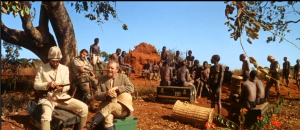 This film takes the story to a credible location and adds some fascinating dimensions to the
original legend. Cornel Wilde, was an actor who had been nominated for
an Academy Award playing Chopin in 1946. The following years are mostly
filled with low level parts in bigger pictures or starring roles in
second level swashbucklers. He created his own production company and
created several films before this piece of rousing adventure
entertainment. Here he is the star, producer and the director and he
does most of this while nearly naked on the set for the whole shoot. He
was fifty two at the time and looked in good shape despite reportedly
being sick with some local bug at the time.
This film takes the story to a credible location and adds some fascinating dimensions to the
original legend. Cornel Wilde, was an actor who had been nominated for
an Academy Award playing Chopin in 1946. The following years are mostly
filled with low level parts in bigger pictures or starring roles in
second level swashbucklers. He created his own production company and
created several films before this piece of rousing adventure
entertainment. Here he is the star, producer and the director and he
does most of this while nearly naked on the set for the whole shoot. He
was fifty two at the time and looked in good shape despite reportedly
being sick with some local bug at the time.
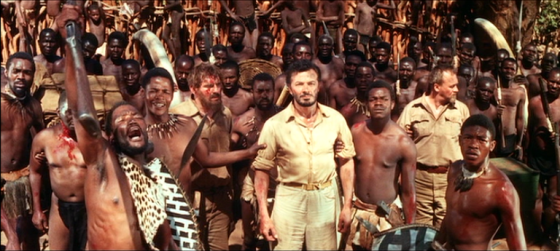
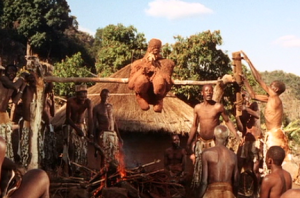
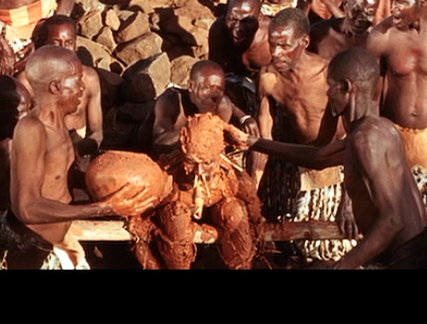 The
picture is pretty brutal for it's time. There is quite a bit of blood
involved, and the animal population of Africa appears to be threatened
with near extinction given the frequency with
which animals die in the course of the story. The images are not
politically correct because the deaths of the safari members at the
hands of the native tribe are gruesome and would do little to endear the
people of that tribe to the rest of the world. I first saw this movie
in the early 1970s and had nightmares over the grim method of execution
chosen for one of the hunters in the safari. He is basically trundled up
and encased in clay for the purpose of roasting alive over a fire. The
thought of the torture is disturbing enough but it was visualized
in a very realistic way and that made it all the more troubling.
Wilde's character is forced to watch the deaths of his compatriots and
then is lead out to a spot where one of the tribesmen shoots an arrow
down field and "Man" is given a head start to the spot where the arrow
has landed. This is where the chase begins.
The
picture is pretty brutal for it's time. There is quite a bit of blood
involved, and the animal population of Africa appears to be threatened
with near extinction given the frequency with
which animals die in the course of the story. The images are not
politically correct because the deaths of the safari members at the
hands of the native tribe are gruesome and would do little to endear the
people of that tribe to the rest of the world. I first saw this movie
in the early 1970s and had nightmares over the grim method of execution
chosen for one of the hunters in the safari. He is basically trundled up
and encased in clay for the purpose of roasting alive over a fire. The
thought of the torture is disturbing enough but it was visualized
in a very realistic way and that made it all the more troubling.
Wilde's character is forced to watch the deaths of his compatriots and
then is lead out to a spot where one of the tribesmen shoots an arrow
down field and "Man" is given a head start to the spot where the arrow
has landed. This is where the chase begins.
We know very little about the character. This was supposed to be his last expedition before he retires to his farm, he is apparently married as there is a moment when his wedding ring is eyed by the hunters as a potential prize, and his name may be Larry, since he was called that a couple of times by another member of the expedition. Most of what we learn about this character is shown through his wits and behaviors both before capture and as he is trying to escape. He has a keen ear and realizes something is wrong before their party is attacked. He was the one who rationally advised paying a small tribute to avoid insulting the natives. He also seems to despise the acts of his partners in killing elephants that are unadorned with ivory tusks. He could easily be one of those experienced trackers from a Western, who know some of the native lingo and cultures and often tries to guide self centered troops or pioneers through dangerous lands. Clearly an archetype, he makes it easy for us to sympathize with him in his run for survival.
The native hunters are certainly cruel by modern standards but they are also human. This is a pretty amazing film in that it manages to create character and story without being dependent on dialogue. After the first ten minutes, the only dialogue we get is spoken in a unique African dialect that is not sub-titled. We know what is going on by watching the faces and hearing the noises the characters make. The ten men that end up hunting "Man", have emotional reactions to the death of their friends, they share moments of laughter and satisfaction, and they turn on one another as the chase becomes more and more deadly. All of this is accomplished without the audience having words to hang onto. It's not the same as a silent film in which the actors might have to exaggerate to convey an emotion or idea, the story telling is more universal and that makes it easy for us to relate to, even when we can't say exactly what the characters are saying.
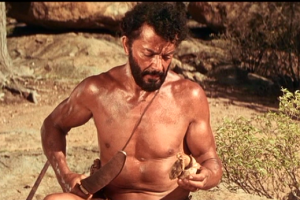 The story becomes a version of "The Most
Dangerous Game" and a nature film. Our hero manages to turn the tables
on his pursuers so he ultimately does have some weapons and a loincloth.
Still, he is alone in the wilderness and must manage to navigate
treacherous terrain, dangerous wildlife and multiple human threats as
well. Like most of these wilderness films, the character tries a variety
of animals, insects and plants to survive on. He
ends up having escargot made from giant crawling mollusks, and lizard
and rat. The one antelope he manages to take down he loses to a predator
higher on the food chain in this environment. There are a couple of
humorous scenes that show him struggling to get some food so while the
circumstances are dire, there is still a bit of humanity to entertain
us.
The story becomes a version of "The Most
Dangerous Game" and a nature film. Our hero manages to turn the tables
on his pursuers so he ultimately does have some weapons and a loincloth.
Still, he is alone in the wilderness and must manage to navigate
treacherous terrain, dangerous wildlife and multiple human threats as
well. Like most of these wilderness films, the character tries a variety
of animals, insects and plants to survive on. He
ends up having escargot made from giant crawling mollusks, and lizard
and rat. The one antelope he manages to take down he loses to a predator
higher on the food chain in this environment. There are a couple of
humorous scenes that show him struggling to get some food so while the
circumstances are dire, there is still a bit of humanity to entertain
us.
The photography in this movie is sometimes spectacular. There are nicely composed shots of the chase through some interesting vistas and jungles. As night falls at one point there is a beautiful shot of the twilight sky, dark orange silhouetting the canopy of trees and hills in the foreground. There are also as many shots of animals as there are of anything else. A baboon turns the tables on a cheetah, just as our hero does the same on his pursuers. Birds are both beautiful and gruesome as they hover near the scenes ready to swoop in and feed on the entrails of other animals. There are several shots of snakes which might give you the creeps if snakes are your own fear. One noticeable mistake is giving a rattlesnake sound effect at one point to snakes that would not have that characteristic in Africa. If we were not immersed in the suspense of the story, it would be a pleasure to take in all of the sights as the film rolls through some great looking locations.
In the last quarter of the film, a long sequence involves "Man" showing that he really is someone to root for. He encounters another tribe that suddenly comes under attack from slavers. The harrowing episodes illustrate that the slave trade was one of the cruelest behaviors that human beings ever imposed on one another. Our hero helps a small girl escape from the scene by creating a dangerous diversion. Later she gets a chance to repay him and we have a brief respite from the grueling adventure and an opportunity to see humanity in a place where we might have despaired of it in the last hour.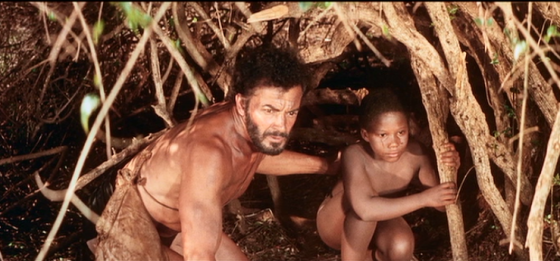 Throughout
the film the hunters and the prey spar over space and distance. This is
one of those films where the hunter wisely chooses when to run and when
to fight. The fight scenes that do happen are usually believable in the
context of the chase. "Man" gets the drop on his pursuers several times
and makes the most of those opportunities. A dramatic use of fire
allows him to put some space between himself and the chasers but also
gives him a chance to taunt them the way that they have taunted him from
the beginning. The struggles of the men chasing him set them back as
much as his efforts do. The men are skillful trackers but they are not
always as clever as the hero needs to be. A dramatic rift appears and it
is clear that the hierarchy of the tribe is created by power and
violence. Despite the murderous actions of the prey and the hunters,
both sides develop a respect for their opposite. That respect may have
existed to begin with since "Man" was given a chance in his torturous
form of execution, but it is multiplied by the tenacity of his fight and
the body count he builds in trying to return to a safe place.
Throughout
the film the hunters and the prey spar over space and distance. This is
one of those films where the hunter wisely chooses when to run and when
to fight. The fight scenes that do happen are usually believable in the
context of the chase. "Man" gets the drop on his pursuers several times
and makes the most of those opportunities. A dramatic use of fire
allows him to put some space between himself and the chasers but also
gives him a chance to taunt them the way that they have taunted him from
the beginning. The struggles of the men chasing him set them back as
much as his efforts do. The men are skillful trackers but they are not
always as clever as the hero needs to be. A dramatic rift appears and it
is clear that the hierarchy of the tribe is created by power and
violence. Despite the murderous actions of the prey and the hunters,
both sides develop a respect for their opposite. That respect may have
existed to begin with since "Man" was given a chance in his torturous
form of execution, but it is multiplied by the tenacity of his fight and
the body count he builds in trying to return to a safe place.
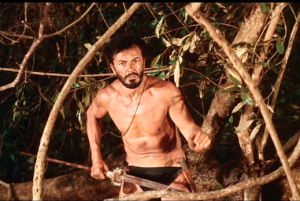 I
suspect that every viewer would imagine themselves in these
circumstances and wonder if they themselves are up to the challenge. As a
kid, loving adventure and the romance of an exotic place, we might hope
to think we would be equal to the trek. An adult might wince with pain
at the brambles and thorns that "Man" sometimes has to dodge and almost
assuredly we would be grateful for the civilization that we enjoy rather
than the brutality of the past we have managed to overcome. There are
still places in the world where human beings treat one another in the
most unimaginably brutal ways. A story like this gives us hope that we
can overcome those hardships and strive to avoid ever being in such a
situation ourselves. This is a tour de force performance from Cornel
Wilde. He manages, without words for most of the film, to evoke strength
and determination and ultimately humanity into a hellish world. As it
was clearly his passion project he should get the lion's share of the
credit. It is interesting to me that the film received an Academy Award
nomination for the script, which was certainly deserving, but that Wilde
was ignored both as director and actor. This is the movie that I
suspect he will best be remembered for. With a nod to the earlier
African adventure "Zulu", let me end this post with a salute to a
valiant warrior, the late Cornel Wilde.
I
suspect that every viewer would imagine themselves in these
circumstances and wonder if they themselves are up to the challenge. As a
kid, loving adventure and the romance of an exotic place, we might hope
to think we would be equal to the trek. An adult might wince with pain
at the brambles and thorns that "Man" sometimes has to dodge and almost
assuredly we would be grateful for the civilization that we enjoy rather
than the brutality of the past we have managed to overcome. There are
still places in the world where human beings treat one another in the
most unimaginably brutal ways. A story like this gives us hope that we
can overcome those hardships and strive to avoid ever being in such a
situation ourselves. This is a tour de force performance from Cornel
Wilde. He manages, without words for most of the film, to evoke strength
and determination and ultimately humanity into a hellish world. As it
was clearly his passion project he should get the lion's share of the
credit. It is interesting to me that the film received an Academy Award
nomination for the script, which was certainly deserving, but that Wilde
was ignored both as director and actor. This is the movie that I
suspect he will best be remembered for. With a nod to the earlier
African adventure "Zulu", let me end this post with a salute to a
valiant warrior, the late Cornel Wilde.
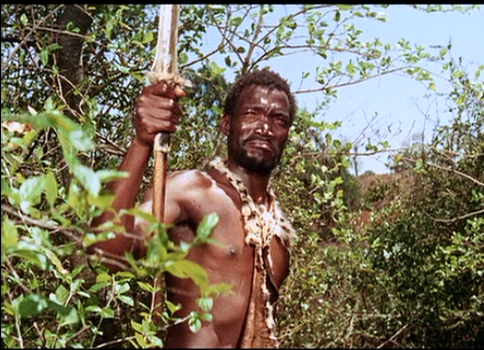
Richard Kirkham is a lifelong movie enthusiast from Southern California. While embracing all genres of film making, he is especially moved to write about and share his memories of movies from his formative years, the glorious 1970s. His personal blog, featuring current film reviews as well as his Summers of the 1970s movie project, can be found at Kirkham A Movie A Day.
Since the invention of film there have been a number of stories that feature man against nature. Those stories have often cast a group of men against a an overwhelming natural force; Hurricanes, fires, floods, the cold of the poles, the heat of the desert and the savagery of animals trying to eat and live. My own experience with such films include "Jeremiah Johnson", "The White Dawn", and "Man in the Wilderness". In the American film experience, a number of these stories featured explorers or pioneers in the West, seeking to survive a trip through Indian lands, to build a new life for themselves or to profit from the natural resources they find on their journey. As part of the narrative there is often contact with other cultures and that contact takes a violent turn. Regardless of whether you sympathize with native peoples whose way of life is threatened or the intruder who sometimes acts foolishly and at other time heroically, these stories can be compelling and exciting. Westerns are littered with ill fated travelers being killed in brutal ways by Indian tribes they encounter (And of course the inverse is true as well, the intruders are not healthy for the native population either).

"The Naked Prey" takes a North American historical incident of this type and transplants it to a similar environment in Africa. An ivory hunting safari is waylaid as it engages in the slaughter of elephants. The hunters have managed to antagonize an indigenous tribe by failing to provide a tribute asked of them. The wisdom of the hunt manager was ignored and the bull headed financier of the expedition dismisses the tribesmen as beggars and thieves. The Western legend has John Colter, once a member of the Lewis and Clark expedition, captured by a Blackfoot tribe, being turned loose by his captors and hunted like an animal. He survived his nearly two week trek through the wilderness, naked and having had to kill several of his pursuers. The lead character in this film, billed as "Man" is the safari manager and has the Colter part.
 This film takes the story to a credible location and adds some fascinating dimensions to the
original legend. Cornel Wilde, was an actor who had been nominated for
an Academy Award playing Chopin in 1946. The following years are mostly
filled with low level parts in bigger pictures or starring roles in
second level swashbucklers. He created his own production company and
created several films before this piece of rousing adventure
entertainment. Here he is the star, producer and the director and he
does most of this while nearly naked on the set for the whole shoot. He
was fifty two at the time and looked in good shape despite reportedly
being sick with some local bug at the time.
This film takes the story to a credible location and adds some fascinating dimensions to the
original legend. Cornel Wilde, was an actor who had been nominated for
an Academy Award playing Chopin in 1946. The following years are mostly
filled with low level parts in bigger pictures or starring roles in
second level swashbucklers. He created his own production company and
created several films before this piece of rousing adventure
entertainment. Here he is the star, producer and the director and he
does most of this while nearly naked on the set for the whole shoot. He
was fifty two at the time and looked in good shape despite reportedly
being sick with some local bug at the time.

 The
picture is pretty brutal for it's time. There is quite a bit of blood
involved, and the animal population of Africa appears to be threatened
with near extinction given the frequency with
which animals die in the course of the story. The images are not
politically correct because the deaths of the safari members at the
hands of the native tribe are gruesome and would do little to endear the
people of that tribe to the rest of the world. I first saw this movie
in the early 1970s and had nightmares over the grim method of execution
chosen for one of the hunters in the safari. He is basically trundled up
and encased in clay for the purpose of roasting alive over a fire. The
thought of the torture is disturbing enough but it was visualized
in a very realistic way and that made it all the more troubling.
Wilde's character is forced to watch the deaths of his compatriots and
then is lead out to a spot where one of the tribesmen shoots an arrow
down field and "Man" is given a head start to the spot where the arrow
has landed. This is where the chase begins.
The
picture is pretty brutal for it's time. There is quite a bit of blood
involved, and the animal population of Africa appears to be threatened
with near extinction given the frequency with
which animals die in the course of the story. The images are not
politically correct because the deaths of the safari members at the
hands of the native tribe are gruesome and would do little to endear the
people of that tribe to the rest of the world. I first saw this movie
in the early 1970s and had nightmares over the grim method of execution
chosen for one of the hunters in the safari. He is basically trundled up
and encased in clay for the purpose of roasting alive over a fire. The
thought of the torture is disturbing enough but it was visualized
in a very realistic way and that made it all the more troubling.
Wilde's character is forced to watch the deaths of his compatriots and
then is lead out to a spot where one of the tribesmen shoots an arrow
down field and "Man" is given a head start to the spot where the arrow
has landed. This is where the chase begins.We know very little about the character. This was supposed to be his last expedition before he retires to his farm, he is apparently married as there is a moment when his wedding ring is eyed by the hunters as a potential prize, and his name may be Larry, since he was called that a couple of times by another member of the expedition. Most of what we learn about this character is shown through his wits and behaviors both before capture and as he is trying to escape. He has a keen ear and realizes something is wrong before their party is attacked. He was the one who rationally advised paying a small tribute to avoid insulting the natives. He also seems to despise the acts of his partners in killing elephants that are unadorned with ivory tusks. He could easily be one of those experienced trackers from a Western, who know some of the native lingo and cultures and often tries to guide self centered troops or pioneers through dangerous lands. Clearly an archetype, he makes it easy for us to sympathize with him in his run for survival.
The native hunters are certainly cruel by modern standards but they are also human. This is a pretty amazing film in that it manages to create character and story without being dependent on dialogue. After the first ten minutes, the only dialogue we get is spoken in a unique African dialect that is not sub-titled. We know what is going on by watching the faces and hearing the noises the characters make. The ten men that end up hunting "Man", have emotional reactions to the death of their friends, they share moments of laughter and satisfaction, and they turn on one another as the chase becomes more and more deadly. All of this is accomplished without the audience having words to hang onto. It's not the same as a silent film in which the actors might have to exaggerate to convey an emotion or idea, the story telling is more universal and that makes it easy for us to relate to, even when we can't say exactly what the characters are saying.
 The story becomes a version of "The Most
Dangerous Game" and a nature film. Our hero manages to turn the tables
on his pursuers so he ultimately does have some weapons and a loincloth.
Still, he is alone in the wilderness and must manage to navigate
treacherous terrain, dangerous wildlife and multiple human threats as
well. Like most of these wilderness films, the character tries a variety
of animals, insects and plants to survive on. He
ends up having escargot made from giant crawling mollusks, and lizard
and rat. The one antelope he manages to take down he loses to a predator
higher on the food chain in this environment. There are a couple of
humorous scenes that show him struggling to get some food so while the
circumstances are dire, there is still a bit of humanity to entertain
us.
The story becomes a version of "The Most
Dangerous Game" and a nature film. Our hero manages to turn the tables
on his pursuers so he ultimately does have some weapons and a loincloth.
Still, he is alone in the wilderness and must manage to navigate
treacherous terrain, dangerous wildlife and multiple human threats as
well. Like most of these wilderness films, the character tries a variety
of animals, insects and plants to survive on. He
ends up having escargot made from giant crawling mollusks, and lizard
and rat. The one antelope he manages to take down he loses to a predator
higher on the food chain in this environment. There are a couple of
humorous scenes that show him struggling to get some food so while the
circumstances are dire, there is still a bit of humanity to entertain
us.The photography in this movie is sometimes spectacular. There are nicely composed shots of the chase through some interesting vistas and jungles. As night falls at one point there is a beautiful shot of the twilight sky, dark orange silhouetting the canopy of trees and hills in the foreground. There are also as many shots of animals as there are of anything else. A baboon turns the tables on a cheetah, just as our hero does the same on his pursuers. Birds are both beautiful and gruesome as they hover near the scenes ready to swoop in and feed on the entrails of other animals. There are several shots of snakes which might give you the creeps if snakes are your own fear. One noticeable mistake is giving a rattlesnake sound effect at one point to snakes that would not have that characteristic in Africa. If we were not immersed in the suspense of the story, it would be a pleasure to take in all of the sights as the film rolls through some great looking locations.
In the last quarter of the film, a long sequence involves "Man" showing that he really is someone to root for. He encounters another tribe that suddenly comes under attack from slavers. The harrowing episodes illustrate that the slave trade was one of the cruelest behaviors that human beings ever imposed on one another. Our hero helps a small girl escape from the scene by creating a dangerous diversion. Later she gets a chance to repay him and we have a brief respite from the grueling adventure and an opportunity to see humanity in a place where we might have despaired of it in the last hour.
 Throughout
the film the hunters and the prey spar over space and distance. This is
one of those films where the hunter wisely chooses when to run and when
to fight. The fight scenes that do happen are usually believable in the
context of the chase. "Man" gets the drop on his pursuers several times
and makes the most of those opportunities. A dramatic use of fire
allows him to put some space between himself and the chasers but also
gives him a chance to taunt them the way that they have taunted him from
the beginning. The struggles of the men chasing him set them back as
much as his efforts do. The men are skillful trackers but they are not
always as clever as the hero needs to be. A dramatic rift appears and it
is clear that the hierarchy of the tribe is created by power and
violence. Despite the murderous actions of the prey and the hunters,
both sides develop a respect for their opposite. That respect may have
existed to begin with since "Man" was given a chance in his torturous
form of execution, but it is multiplied by the tenacity of his fight and
the body count he builds in trying to return to a safe place.
Throughout
the film the hunters and the prey spar over space and distance. This is
one of those films where the hunter wisely chooses when to run and when
to fight. The fight scenes that do happen are usually believable in the
context of the chase. "Man" gets the drop on his pursuers several times
and makes the most of those opportunities. A dramatic use of fire
allows him to put some space between himself and the chasers but also
gives him a chance to taunt them the way that they have taunted him from
the beginning. The struggles of the men chasing him set them back as
much as his efforts do. The men are skillful trackers but they are not
always as clever as the hero needs to be. A dramatic rift appears and it
is clear that the hierarchy of the tribe is created by power and
violence. Despite the murderous actions of the prey and the hunters,
both sides develop a respect for their opposite. That respect may have
existed to begin with since "Man" was given a chance in his torturous
form of execution, but it is multiplied by the tenacity of his fight and
the body count he builds in trying to return to a safe place. I
suspect that every viewer would imagine themselves in these
circumstances and wonder if they themselves are up to the challenge. As a
kid, loving adventure and the romance of an exotic place, we might hope
to think we would be equal to the trek. An adult might wince with pain
at the brambles and thorns that "Man" sometimes has to dodge and almost
assuredly we would be grateful for the civilization that we enjoy rather
than the brutality of the past we have managed to overcome. There are
still places in the world where human beings treat one another in the
most unimaginably brutal ways. A story like this gives us hope that we
can overcome those hardships and strive to avoid ever being in such a
situation ourselves. This is a tour de force performance from Cornel
Wilde. He manages, without words for most of the film, to evoke strength
and determination and ultimately humanity into a hellish world. As it
was clearly his passion project he should get the lion's share of the
credit. It is interesting to me that the film received an Academy Award
nomination for the script, which was certainly deserving, but that Wilde
was ignored both as director and actor. This is the movie that I
suspect he will best be remembered for. With a nod to the earlier
African adventure "Zulu", let me end this post with a salute to a
valiant warrior, the late Cornel Wilde.
I
suspect that every viewer would imagine themselves in these
circumstances and wonder if they themselves are up to the challenge. As a
kid, loving adventure and the romance of an exotic place, we might hope
to think we would be equal to the trek. An adult might wince with pain
at the brambles and thorns that "Man" sometimes has to dodge and almost
assuredly we would be grateful for the civilization that we enjoy rather
than the brutality of the past we have managed to overcome. There are
still places in the world where human beings treat one another in the
most unimaginably brutal ways. A story like this gives us hope that we
can overcome those hardships and strive to avoid ever being in such a
situation ourselves. This is a tour de force performance from Cornel
Wilde. He manages, without words for most of the film, to evoke strength
and determination and ultimately humanity into a hellish world. As it
was clearly his passion project he should get the lion's share of the
credit. It is interesting to me that the film received an Academy Award
nomination for the script, which was certainly deserving, but that Wilde
was ignored both as director and actor. This is the movie that I
suspect he will best be remembered for. With a nod to the earlier
African adventure "Zulu", let me end this post with a salute to a
valiant warrior, the late Cornel Wilde.
Richard Kirkham is a lifelong movie enthusiast from Southern California. While embracing all genres of film making, he is especially moved to write about and share his memories of movies from his formative years, the glorious 1970s. His personal blog, featuring current film reviews as well as his Summers of the 1970s movie project, can be found at Kirkham A Movie A Day.